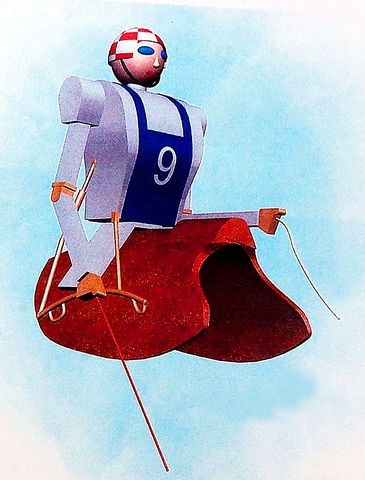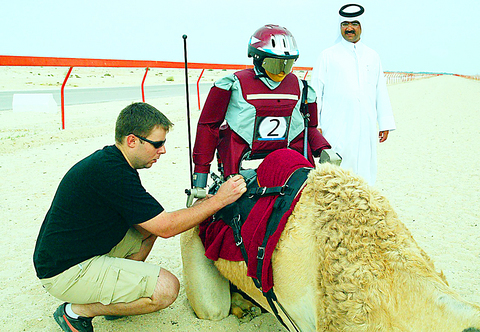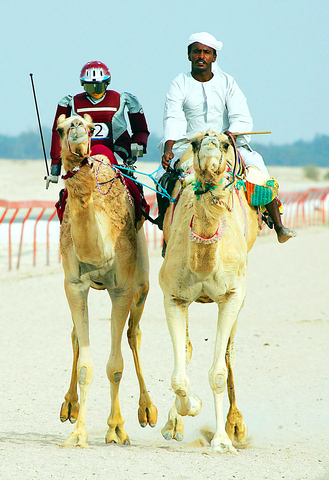On its first run round a Qatari camel-racing course, the robot jockey has set a time seconds off the record set by a child jockey, whose use in the popular sport has been banned after international criticism.
"We're 20 seconds away from the best time using a human jockey over 5km," said Alexander Colot, director of the Swiss firm K-team, which has built the robot jockey for Qatar.
The robot challenged its only competitor, a child jockey, over the 5km course on the Al-Shahaniya race track near Doha, while spectators and media watched, drawn to this unique event.

PHOTOS: AFP
Gulf Arab monarchies are trying to bring order to the sport in the face of protests over the trafficking of young children from developing countries, mostly in Asia, who become jockeys.
Human-rights groups raised alarm over the exploitation of children by traffickers who pay impoverished parents a paltry sum or simply kidnap their victims.
The children, mostly from Bangladesh, Sri Lanka and Pakistan, are then smuggled into the oil-rich Gulf states.

They are often starved by employers to keep them light and maximize their racing potential. Mounting camels three times their height, the children -- some as young as six -- face the risk of being thrown off and trampled.
Earlier this month, the United Arab Emirates (UAE) successfully completed its first robot-jockey exercise, with a ban on the use of jockeys aged under 16 and weighing less than 45kg also now in effect.
The UAE had in principle already banned the use of children under 15 since 1993, but abuses remain widespread and no one was ever prosecuted.

PHOTOS: AFP
In December, Qatar banned the use of children in camel races and said it was preparing to use robot jockeys from 2005.
Mounted on a racing camel, which has an average speed of 40kph, the remote-controlled robot jockey displays remarkably similar gestures to those of a human jockey, even whipping the camel to make it go faster.
After "about 30 attempts" since launching the idea in April 2004, "the product is now ready," said Colot.
Property rights for the robot have been registered for Qatar.
"No one can manufacture [a robot] without the authorization of Qatar," said Rashed Ali Ibrahim, a member of the Qatari committee charged with promoting robot jockeys.
According to Colot, "the Emirati model (resembles) a doll rather than a robot."
Doha is increasingly set on developing its own robot jockey, "notably with a movement of arms and battery-powered," said committee president Sheikh Abdullah bin Saud al-Thani, who announced a plan to create "a factory for robot jockeys" in the gas-rich Gulf state.
"We hope to introduce around 20 robot jockeys" next year at Qatar's annual grand prix, he said.
While the Swiss manufacturer refuses to reveal the cost of the project, Sheikh Abdullah said, "the first phase involved investments of some 3 million riyals (US$800,000)."
"This experiment can succeed and be generalized," said Fredj Fenniche, regional representative for the UN Human Rights Commission.
"Our way seeks to make Qatar a state of law and respect of human rights, and we won't tolerate going against this," said Sheikh Hamad bin Jassim bin Faisal al-Thani, president of the organizing committee for camel races in Qatar.

On April 26, The Lancet published a letter from two doctors at Taichung-based China Medical University Hospital (CMUH) warning that “Taiwan’s Health Care System is on the Brink of Collapse.” The authors said that “Years of policy inaction and mismanagement of resources have led to the National Health Insurance system operating under unsustainable conditions.” The pushback was immediate. Errors in the paper were quickly identified and publicized, to discredit the authors (the hospital apologized). CNA reported that CMUH said the letter described Taiwan in 2021 as having 62 nurses per 10,000 people, when the correct number was 78 nurses per 10,000

As we live longer, our risk of cognitive impairment is increasing. How can we delay the onset of symptoms? Do we have to give up every indulgence or can small changes make a difference? We asked neurologists for tips on how to keep our brains healthy for life. TAKE CARE OF YOUR HEALTH “All of the sensible things that apply to bodily health apply to brain health,” says Suzanne O’Sullivan, a consultant in neurology at the National Hospital for Neurology and Neurosurgery in London, and the author of The Age of Diagnosis. “When you’re 20, you can get away with absolute

May 5 to May 11 What started out as friction between Taiwanese students at Taichung First High School and a Japanese head cook escalated dramatically over the first two weeks of May 1927. It began on April 30 when the cook’s wife knew that lotus starch used in that night’s dinner had rat feces in it, but failed to inform staff until the meal was already prepared. The students believed that her silence was intentional, and filed a complaint. The school’s Japanese administrators sided with the cook’s family, dismissing the students as troublemakers and clamping down on their freedoms — with

As Donald Trump’s executive order in March led to the shuttering of Voice of America (VOA) — the global broadcaster whose roots date back to the fight against Nazi propaganda — he quickly attracted support from figures not used to aligning themselves with any US administration. Trump had ordered the US Agency for Global Media, the federal agency that funds VOA and other groups promoting independent journalism overseas, to be “eliminated to the maximum extent consistent with applicable law.” The decision suddenly halted programming in 49 languages to more than 425 million people. In Moscow, Margarita Simonyan, the hardline editor-in-chief of the